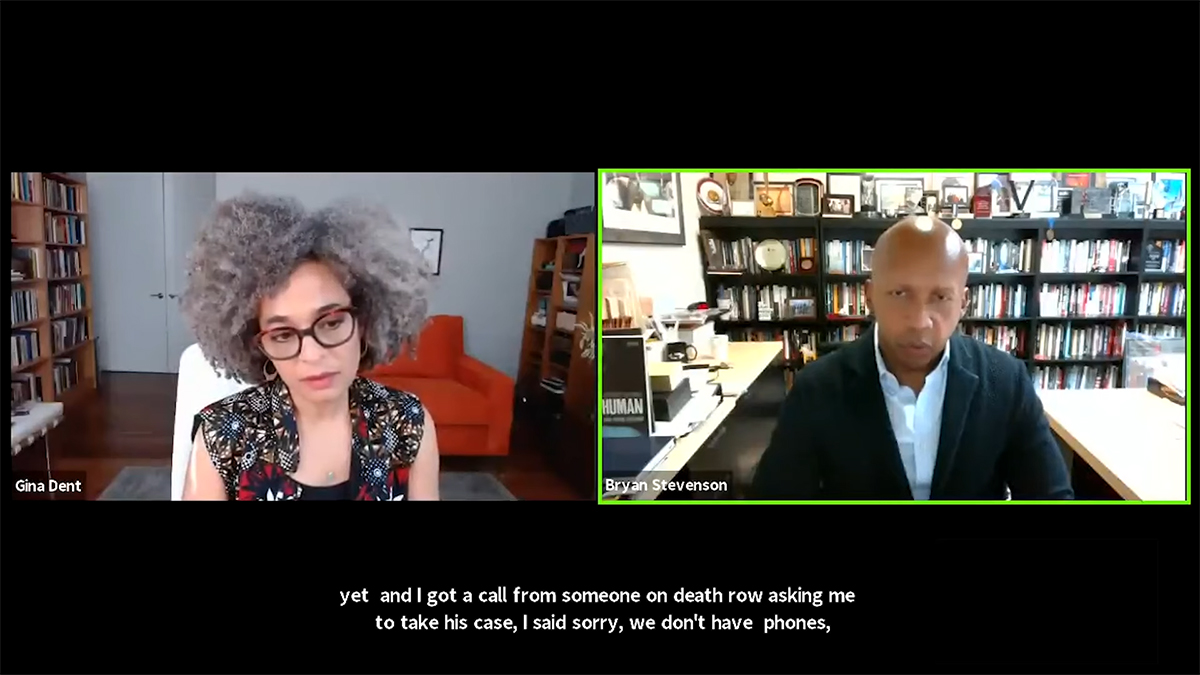“Paso Seguro”: Demanding Safe Passage For All
City on a Hill Press Bryce Chen, March 17, 2025 On a field of green grass overlooking Monterey Bay, around 150 people sat with their...



Bryan Stevenson
Images, Memory, and Justice
October 27,2020, 4-5:30 p.m.
Bryan Stevenson is a widely acclaimed public interest lawyer who has, over the last two decades, tirelessly worked to challenge the racial and economic injustices of mass incarceration in the United States. Stevenson has also been at the forefront of the creation of two cultural sites, The Legacy Museum and The National Memorial for Peace and Justice. For Visualizing Abolition, Stevenson will discuss how those institutions relate to his legal social justice initiatives. The wide-ranging conversation with Professor Dent will focus on the role images, art, and culture can have in how people see and understand the legacies of history, as well as how re-envisioning history can enliven contemporary struggles against racial inequality and the criminal justice system.
Visualizing Abolition is a series of online events organized in collaboration with Professor Gina Dent and featuring artists, activists, and scholars united by their commitment to the vital struggle for prison abolition. Originally, Visualizing Abolition was being planned as an in-person symposium. Due to the ongoing pandemic, the panels, artist talks, film screenings, and other events will instead take place online. The events accompany Barring Freedom, an exhibition of contemporary art on view at San José Museum of Art October 30, 2020-March 21, 2021. To accompany the exhibition, Solitary Garden, a public art project about mass incarceration and solitary confinement is on view at UC Santa Cruz. Barring Freedom travels to NYC John Jay College of Criminal Justice April 28-July 15, 2021.
mic year, UC Santa Cruz Institute of the Arts and Sciences, in collaboration with Professor Gina Dent, feminist studies, has organized a year-long series of online events featuring artists, activists, scholars, and others united by their commitment to the vital struggle for prison abolition. Originally, Visualizing Abolition was being planned as an in-person symposium, bringing together artists, lawyers, scholars, and other thinkers to challenge the dominant ways people see and understand issues of mass incarceration, detention, and policing in the United States and beyond. Due to the ongoing pandemic, the panels, artist talks, film screenings, and other events will now take place online, emphasizing with ever more urgency the importance of envisioning alternatives to ongoing injustices.
The events of Visualizing Abolition accompany Barring Freedom, a bi-coastal exhibition of art featuring Sonya Clark, American Artist, Dread Scott, Deana Lawson, Chandra McCormick and Keith Calhoun, Sharon Daniel, Sanford Biggers, and other artists whose practices creatively confront the failure of many to see the racist biases within the criminal justice system or to comprehend the economic and social problems that the system serves to obscure. Barring Freedom will be on view at San José Museum of Art October 30, 2020-March 21, 2021. Simultaneously on view at UC Santa Cruz is Solitary Garden, a public art project about mass incarceration and solitary confinement. Barring Freedom travels to NYC John Jay College of Criminal Justice April 28-July 15, 2021.
Bryan Stevenson is the founder and Executive Director of the Equal Justice Initiative (EJI), a human rights organization in Montgomery, Alabama. Mr. Stevenson is a widely acclaimed public interest lawyer who has dedicated his career to helping the poor, the incarcerated, and the condemned. Under his leadership, EJI has won major legal challenges eliminating excessive and unfair sentencing, exonerating innocent death row prisoners, confronting abuse of the incarcerated and the mentally ill, and aiding children prosecuted as adults. Mr. Stevenson and his staff have won reversals, relief or release from prison for over 135 wrongly condemned prisoners on death row and won relief for hundreds of others wrongly convicted or unfairly sentenced. Mr. Stevenson has argued and won multiple cases at the U.S. Supreme Court, including a 2019 ruling protecting condemned prisoners who suffer from dementia and a landmark 2012 ruling that banned mandatory life-without-parole sentences for all children 17 or younger. Mr. Stevenson has initiated major new anti-poverty and anti-discrimination efforts that challenge inequality in America. He led the creation of two highly acclaimed cultural sites which opened in 2018, The Legacy Museum and The National Memorial for Peace and Justice. The new national landmark institutions chronicle the legacy of slavery, lynching and racial segregation and the connection to mass incarceration and contemporary issues of racial bias. Mr. Stevenson’s work has won him numerous awards including over 40 honorary doctorates, the MacArthur Foundation “Genius” Prize and the ABA Medal, the American Bar Association’s highest honor. He is a graduate of the Harvard Law School and the Harvard School of Government and the author of the award winning New York Times bestseller, Just Mercy, which was recently adapted as a major motion picture.
Gina Dent, Associate Professor of Feminist Studies, History of Consciousness, and Legal Studies, UCSC, is a committed activist, scholar, and educator. Abolition. Feminism. Now. (March 2021, Haymarket Press) co-authored by Dent with Angela Davis, Beth Richie, and Erica Meiners, grows out of her work as an advocate for human rights and prison abolition. She is the editor of Black Popular Culture, and author of numerous articles on race, feminism, popular culture, and visual art.
Visualizing Abolition is organized by UC Santa Cruz Institute of the Arts and Sciences in collaboration with San José Museum of Art and Mary Porter Sesnon Art Gallery. The series has been generously funded by the Nion McEvoy Family Trust, Ford Foundation, Future Justice Fund, Wanda Kownacki, Peter Coha, James L. Gunderson, Rowland and Pat Rebele, Porter College, UCSC Foundation, and annual donors to the Institute of the Arts and Sciences.
Partners include: Howard University School of Law, McEvoy Foundation for the Arts, Jessica Silverman Gallery, Indexical, The Humanities Institute, University Library, University Relations, Institute for Social Transformation, Eloise Pickard Smith Gallery, Porter College, the Center for Cultural Studies, the Center for Creative Ecologies, and Media and Society, Kresge College.